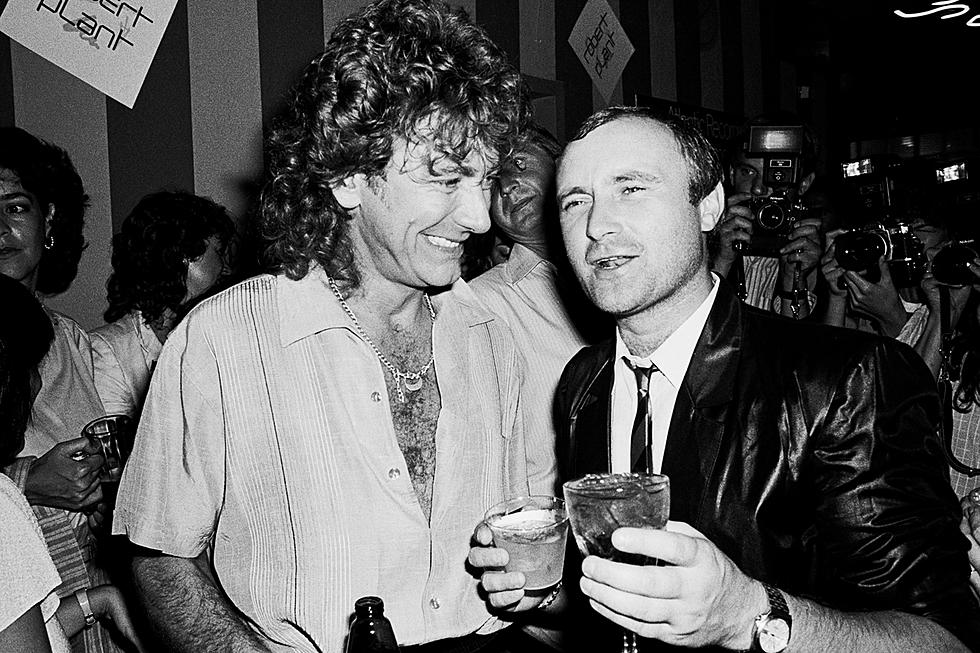
Why Phil Collins Quit Genesis
It isn't often that the frontman for a bestselling band is able to fly the coop for a solo career without leaving a few hurt feelings or full-on grudges behind. Phil Collins proved an amusing exception to the rule on March 28, 1996.
Collins, who'd been pulling double duty as drummer and lead singer for the band since Peter Gabriel departed the lineup in 1975, had successfully managed to juggle his own multi-platinum solo career alongside Genesis' increasingly massive worldwide profile throughout the '80s. But in the years after the band's We Can't Dance LP in 1991, he found himself unable to shake the feeling that his time in the lineup had run its course.
Urged by management to give himself time to fully absorb the idea, Collins didn't rush his decision, waiting until well after the trio concluded their tour in support of the album to approach bandmates Mike Rutherford and Tony Banks about his plans to depart. True to form for a band that had always kept things relatively low-key even as they conquered arenas — and displayed a wry sense of humor along the way — they announced Collins' exit with a tongue-in-cheek press release that kept things to the point while deflating the false sense of importance that tends to go along with selling millions of albums.
"Genesis, one of the most successful rock bands in the world, are currently seeking a vocalist," read the band's statement. "For the past 20 years, drummer Phil Collins has been temping as a singer, to great acclaim. Now however he has decided to move on in order to concentrate on his solo projects."
Although Collins was already deep into preparations for his next solo release and would be forced to contend with questions about the split soon enough, he kept his initial comments to a single brief quote appended to the press release. "Having been with Genesis for 25 years, I felt it time to change direction in my musical life," he wrote. "For me now it will be music for movies, some jazz projects and of course my solo career. I wish the guys in Genesis all the very best in their future. We remain the best of friends."
"Of course we'll miss him. We have had some fantastic times together," added Banks. "But this gives us a chance to take Genesis to the next stage."
For fans, Collins' departure was both a surprise and a long time coming. Although plenty of pundits had openly wondered how long Genesis could stay together after Collins established himself outside the group in the '80s, and his 1985 juggernaut No Jacket Required seemed to offer the perfect opening into a full-time solo career, the band members all seemed perfectly content to pursue their own projects while continuing Genesis indefinitely. Yet as Rutherford later admitted, he and Banks always knew a split with Collins was a possibility.
"Looking back now, I see how strange it was for him to have gone from being the drummer to the singer," Rutherford wrote in his memoir The Living Years. "He did it so effortlessly that I don't think Tony or I ever thought much about it at the time, but it had never been part of his plan. All of this meant that when we went for a meeting at [manager] Tony Smith's house ... one day in 1996 and Phil said 'I think I'm going to call it a day,' it wasn't really a surprise. The surprise was that he'd stayed with Genesis as long as he had, after all that had happened with his solo career."
To his credit, Collins didn't seem to have solo sales as a motivation for his decision. The sound of his voice dominated pop radio during the mid-to-late '80s, years in which he ping-ponged between hit solo records like No Jacket Required and ... But Seriously while Genesis scored the biggest pop singles of its career. But by the mid-'90s, his biggest years were behind him, and his most recent release, 1993's Both Sides, was regarded as something of a commercial disappointment after peaking at No. 13, going platinum and spinning off a pair of Top 40 singles. Yet for him, the album remained a crucial artistic turning point.
"When I did Both Sides, I felt that I'd arrived at a place, musically speaking, that really was the most fulfilling for me," Collins told the Baltimore Sun. "That, to me, is organic music. That is what people have always criticized me for not being. I thought, not only am I doing something that's fulfilling to me, but maybe this will be the album that people will say, 'Yeah, he's got rid of all that fluff.' ... At my age, I should be able to stand up and be counted, and not really do anything I don't want to do."
Banks and Rutherford, meanwhile, opted to soldier on — at least in the short term — with new singer Ray Wilson, who joined Genesis for what would turn out to be their final studio album, 1997's Calling All Stations. And as magnanimous as is former bandmates seemed to be regarding his departure, Collins extended the same well wishes in their direction — and offered Wilson his tacit blessing in the bargain.
"Ultimately, I'm pleased that Genesis are carrying on," Collins insisted. "It's very important for me. I certainly didn't want to destroy something, and Mike and Tony understood. I just hope that the fans out there will keep an open mind as they did when I took over."
Genesis Solo Albums Ranked
See Phil Collins in Rock’s Craziest Conspiracy Theories
More From Eagle 102.3










